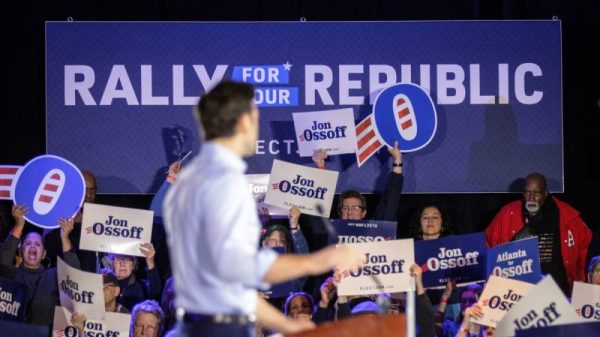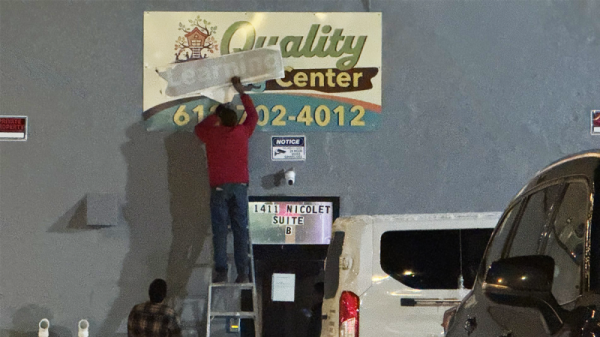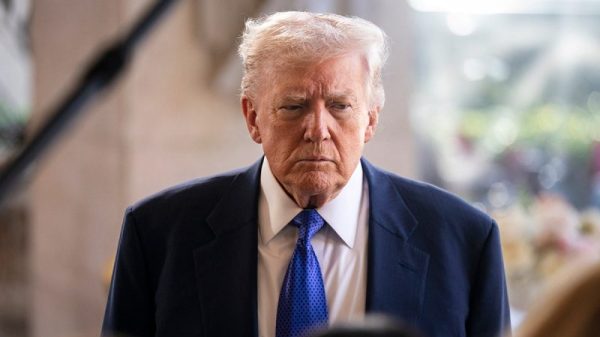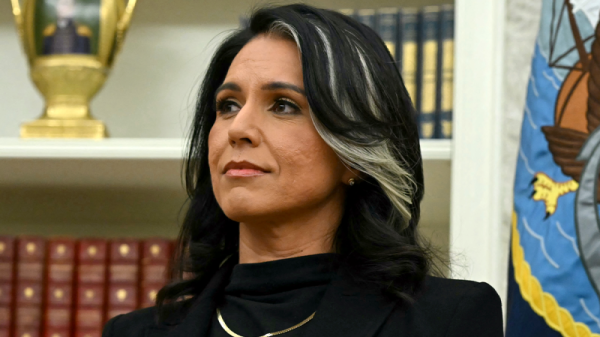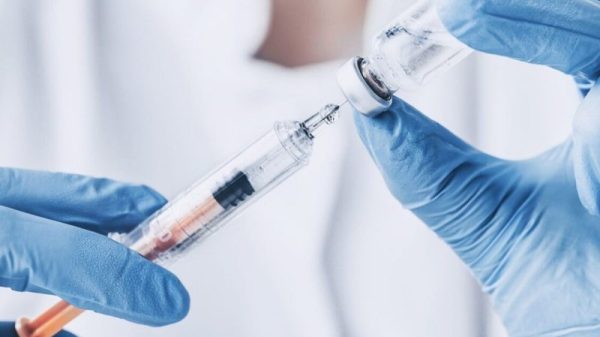A former leader of the far-right Proud Boys group was sentenced Thursday to 17 years in prison, just shy of the longest punishment imposed on a participant in the Jan. 6, 2021, riot at the U.S. Capitol.
“That day broke our tradition of peaceful transfer of power, one of the most precious things we had as Americans,” U.S. District Judge Timothy J. Kelly said as he sentenced Joseph Biggs, 39, of Florida. “We don’t have it anymore.”
Later Thursday, Kelly sentenced Zachary Rehl, 38, who led the Philadelphia Proud Boys, to 15 years in prison. Biggs and Rehl are two of four Proud Boys found guilty earlier this year of engaging in a seditious conspiracy to keep Donald Trump in power by force. The case was one of the highest-profile prosecutions of the thousand-plus lodged against participants in the Capitol riot. While steep, the sentences are about half of what prosecutors sought and federal sentencing guidelines suggested.
“I probably never will sentence someone 15 years below the guidelines in my entire career” after this, said Kelly, who took the bench in 2017. But he said he believed the recommended sentences “overstate” the crime.
Oath Keepers founder Stewart Rhodes, found guilty of a separate seditious conspiracy involving his extremist group, was sentenced earlier this year to 18 years in prison. In both cases, judges applied enhancements for terrorism that pushed the punishment ranges they must consider higher. But Kelly said his sentences would have been the same regardless of that ruling. “It’s not my job to label you a terrorist, and my sentence today won’t do that,” Kelly told Biggs. “That’s for other people to argue about.”
While he called it “a miracle” that more people weren’t killed on Jan. 6, the judge said “there was nothing to suggest” the Proud Boys planned anything akin to a bombing, a battlefield killing spree or trying to “blow up a skyscraper.”
What to know about the Proud Boys sedition trial
End of carousel
The Justice Department argued that Biggs and Rehl were engaged in terrorism in coordination with former Proud Boys chairman Henry “Enrique” Tarrio, who is set to be sentenced Tuesday.
“They aimed to intimidate and terrify” not just lawmakers but also “the rest of the country that they didn’t agree with and make them yield to their political point of view,” Assistant U.S. Attorney Jason McCullough said in court. “That’s no different than the act of a spectacular bombing of a building.”
He invoked the example of a parent afraid to take a child to a polling place or a couple worried about violence at a presidential inauguration.
“That is what they set out to do,” McCullough said. “They pushed us to the edge of a constitutional crisis.”
He said deterrence was necessary precisely because the Proud Boys were able to create that fear without any weapons of mass destruction. “It’s almost seductive,” McCullough said. “It just takes slick propaganda in an environment where you encourage people to basically say, ‘It’s us against them.’”
Biggs told the judge he was not a leader but one of the “seduced.”
“I know that I messed up that day, but I’m not a terrorist,” Biggs said. “My curiosity got the better of me, and I’ll have to live with that for the rest of my life.” He said he had been planning for Jan. 6 to be his last outing with the Proud Boys, and that his statements about killing lawmakers were a way to vent his anger over being injured in combat and learning that a young family member had been abused. “I used that rhetoric … to cope and to not take violent action,” he said.
Defense attorney Norm Pattis argued that it was harsh sentences for the Proud Boys that would make “people afraid to go to protests, for fear that if they become violent their incendiary speech might be used against them.” And he warned that long sentences would “create a martyrdom syndrome” among anti-government activists akin to the deadly 1993 siege near Waco, Tex.
Kelly responded that it was “fair game” to consider protected speech as evidence of criminal intent. “People’s fear that if they get violent their words will be used against them — there’s simply no legal reason why that can’t be,” he said.
Prosecutors argued Biggs had “talents” that made him particularly dangerous, recommending a higher sentence for him than Rehl because of his leadership role in the attack. As a former employee of Infowars host Alex Jones, who helped organize the rally that preceded the riot, Biggs had a national platform. As a combat veteran, he had military experience. And he was close with Tarrio, who was barred from D.C. before Jan. 6 over the theft and destruction of a Black Lives Matter flag at an earlier protest.
Tarrio had created a leadership group for Jan. 6 that included Biggs, Rehl and Ethan Nordean of the Seattle area, who is set to be sentenced Friday. They led a group of about 200 Proud Boys to the Capitol before Trump directed his supporters there. Then, prosecutors say, the Proud Boys led the growing mob forward through barricades and into the building. Capitol Police officer Shae Cooney testified earlier in the week about standing on the other side of that crowd, trying to keep them out. She couldn’t stop to connect with her family, she said, or to check on Officer Brian D. Sicknick, who collapsed hours after the riot and died the next day.
“They decided to break the law, assault officers and cause an officer to lose his life and have other officers take their lives because of things that they saw,” Cooney said. “Because the people in this courtroom decided that they weren’t happy with how an election went.”
After the riot, Biggs lied to the FBI, saying first that he wasn’t at the Capitol and then that he was but he never went inside. He also encouraged other Proud Boys to delete any potentially incriminating messages after Tarrio’s arrest. Like several other Proud Boys, Biggs was in contact with federal agents in advance of Jan. 6 but only provided information about the group’s enemies on the left, according to court records.
The government argued that Rehl deserved a particularly heavy punishment because he sprayed police officers with chemicals and then lied about it on the stand. He also recruited members in advance of Jan. 6 by sharing videos online of violent confrontations with counterprotesters. “Rehl in particular and these defendants generally knew the effect that they had on the people they referred to as ‘the normies,’” Assistant U.S. Attorney Erik Kenerson said. “These defendants are lucky that January 6 did not turn into a mass-casualty event.”
Representing both Biggs and Rehl, defense attorney Pattis argued that they were not responsible for Trump’s efforts to undermine the democratic process.
“There is a crisis of legitimacy in this country,” Pattis said, but “to suggest that this is the responsibility” of the Proud Boys “is silly.” He questioned why Trump was not charged with seditious conspiracy when he was indicted on other felony counts related to the 2020 election. “They heeded the president’s call,” he said, and are now being punished “for taking their president seriously.”
When he addressed the court, Rehl alluded to Trump’s role, saying he fell “hook, line and sinker” for lies about the election being stolen.
“I wasted my time on politics for people who aren’t even here today, for people who haven’t offered any support and for people who let me sink all the way to the bottom,” he said. “I’m done peddling lies for people who do not care about me.”
Both men are disabled veterans who lost their military benefits when they were charged. Both cried in court when talking about the daughters they will leave behind when they go to prison.
Kelly said he felt for them both but had to consider their current remorse in light of their “chilling” statements around Jan. 6.
“There is a need to deter violence in our society today,” he said.
Along with Nordean, Dominic Pezzola will be sentenced Friday. Pezzola was acquitted of seditious conspiracy but convicted of stealing a police riot shield that he then used to break a window and create the first breach of the Capitol building.
Tom Jackman contributed to this report.
A former leader of the far-right Proud Boys group was sentenced Thursday to 17 years in prison, just shy of the longest punishment imposed on a participant in the Jan. 6, 2021, riot at the U.S. Capitol.
“That day broke our tradition of peaceful transfer of power, one of the most precious things we had as Americans,” U.S. District Judge Timothy J. Kelly said as he sentenced Joseph Biggs, 39, of Florida. “We don’t have it anymore.”
Later Thursday, Kelly sentenced Zachary Rehl, 38, who led the Philadelphia Proud Boys, to 15 years in prison. Biggs and Rehl are two of four Proud Boys found guilty earlier this year of engaging in a seditious conspiracy to keep Donald Trump in power by force. The case was one of the highest-profile prosecutions of the thousand-plus lodged against participants in the Capitol riot. While steep, the sentences are about half of what prosecutors sought and federal sentencing guidelines suggested.
“I probably never will sentence someone 15 years below the guidelines in my entire career” after this, said Kelly, who took the bench in 2017. But he said he believed the recommended sentences “overstate” the crime.
Oath Keepers founder Stewart Rhodes, found guilty of a separate seditious conspiracy involving his extremist group, was sentenced earlier this year to 18 years in prison. In both cases, judges applied enhancements for terrorism that pushed the punishment ranges they must consider higher. But Kelly said his sentences would have been the same regardless of that ruling. “It’s not my job to label you a terrorist, and my sentence today won’t do that,” Kelly told Biggs. “That’s for other people to argue about.”
While he called it “a miracle” that more people weren’t killed on Jan. 6, the judge said “there was nothing to suggest” the Proud Boys planned anything akin to a bombing, a battlefield killing spree or trying to “blow up a skyscraper.”
What to know about the Proud Boys sedition trial
End of carousel
The Justice Department argued that Biggs and Rehl were engaged in terrorism in coordination with former Proud Boys chairman Henry “Enrique” Tarrio, who is set to be sentenced Tuesday.
“They aimed to intimidate and terrify” not just lawmakers but also “the rest of the country that they didn’t agree with and make them yield to their political point of view,” Assistant U.S. Attorney Jason McCullough said in court. “That’s no different than the act of a spectacular bombing of a building.”
He invoked the example of a parent afraid to take a child to a polling place or a couple worried about violence at a presidential inauguration.
“That is what they set out to do,” McCullough said. “They pushed us to the edge of a constitutional crisis.”
He said deterrence was necessary precisely because the Proud Boys were able to create that fear without any weapons of mass destruction. “It’s almost seductive,” McCullough said. “It just takes slick propaganda in an environment where you encourage people to basically say, ‘It’s us against them.’”
Biggs told the judge he was not a leader but one of the “seduced.”
“I know that I messed up that day, but I’m not a terrorist,” Biggs said. “My curiosity got the better of me, and I’ll have to live with that for the rest of my life.” He said he had been planning for Jan. 6 to be his last outing with the Proud Boys, and that his statements about killing lawmakers were a way to vent his anger over being injured in combat and learning that a young family member had been abused. “I used that rhetoric … to cope and to not take violent action,” he said.
Defense attorney Norm Pattis argued that it was harsh sentences for the Proud Boys that would make “people afraid to go to protests, for fear that if they become violent their incendiary speech might be used against them.” And he warned that long sentences would “create a martyrdom syndrome” among anti-government activists akin to the deadly 1993 siege near Waco, Tex.
Kelly responded that it was “fair game” to consider protected speech as evidence of criminal intent. “People’s fear that if they get violent their words will be used against them — there’s simply no legal reason why that can’t be,” he said.
Prosecutors argued Biggs had “talents” that made him particularly dangerous, recommending a higher sentence for him than Rehl because of his leadership role in the attack. As a former employee of Infowars host Alex Jones, who helped organize the rally that preceded the riot, Biggs had a national platform. As a combat veteran, he had military experience. And he was close with Tarrio, who was barred from D.C. before Jan. 6 over the theft and destruction of a Black Lives Matter flag at an earlier protest.
Tarrio had created a leadership group for Jan. 6 that included Biggs, Rehl and Ethan Nordean of the Seattle area, who is set to be sentenced Friday. They led a group of about 200 Proud Boys to the Capitol before Trump directed his supporters there. Then, prosecutors say, the Proud Boys led the growing mob forward through barricades and into the building. Capitol Police officer Shae Cooney testified earlier in the week about standing on the other side of that crowd, trying to keep them out. She couldn’t stop to connect with her family, she said, or to check on Officer Brian D. Sicknick, who collapsed hours after the riot and died the next day.
“They decided to break the law, assault officers and cause an officer to lose his life and have other officers take their lives because of things that they saw,” Cooney said. “Because the people in this courtroom decided that they weren’t happy with how an election went.”
After the riot, Biggs lied to the FBI, saying first that he wasn’t at the Capitol and then that he was but he never went inside. He also encouraged other Proud Boys to delete any potentially incriminating messages after Tarrio’s arrest. Like several other Proud Boys, Biggs was in contact with federal agents in advance of Jan. 6 but only provided information about the group’s enemies on the left, according to court records.
The government argued that Rehl deserved a particularly heavy punishment because he sprayed police officers with chemicals and then lied about it on the stand. He also recruited members in advance of Jan. 6 by sharing videos online of violent confrontations with counterprotesters. “Rehl in particular and these defendants generally knew the effect that they had on the people they referred to as ‘the normies,’” Assistant U.S. Attorney Erik Kenerson said. “These defendants are lucky that January 6 did not turn into a mass-casualty event.”
Representing both Biggs and Rehl, defense attorney Pattis argued that they were not responsible for Trump’s efforts to undermine the democratic process.
“There is a crisis of legitimacy in this country,” Pattis said, but “to suggest that this is the responsibility” of the Proud Boys “is silly.” He questioned why Trump was not charged with seditious conspiracy when he was indicted on other felony counts related to the 2020 election. “They heeded the president’s call,” he said, and are now being punished “for taking their president seriously.”
When he addressed the court, Rehl alluded to Trump’s role, saying he fell “hook, line and sinker” for lies about the election being stolen.
“I wasted my time on politics for people who aren’t even here today, for people who haven’t offered any support and for people who let me sink all the way to the bottom,” he said. “I’m done peddling lies for people who do not care about me.”
Both men are disabled veterans who lost their military benefits when they were charged. Both cried in court when talking about the daughters they will leave behind when they go to prison.
Kelly said he felt for them both but had to consider their current remorse in light of their “chilling” statements around Jan. 6.
“There is a need to deter violence in our society today,” he said.
Along with Nordean, Dominic Pezzola will be sentenced Friday. Pezzola was acquitted of seditious conspiracy but convicted of stealing a police riot shield that he then used to break a window and create the first breach of the Capitol building.
Tom Jackman contributed to this report.

